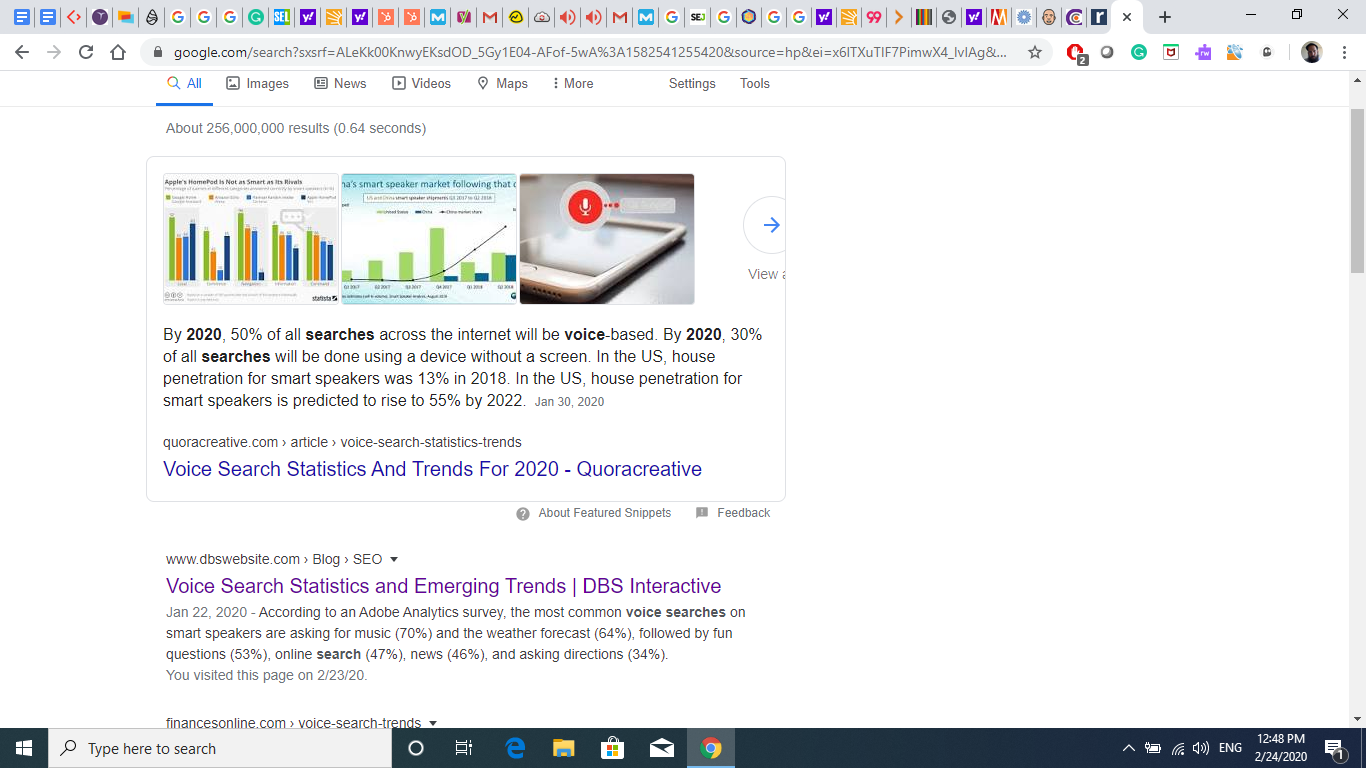2020 and Beyond: what will change in SEO?

2020 and Beyond: what will change in SEO?
In this follow up piece, to what will stay the same with SEO in 2020, we now shift our gaze to 2020-and beyond. Voice search is on the rise, and the spread of voice-assistants and other technology is impacting consumer search behaviors. How you respond to these trends is critical today and for the future of your business.
Voice Search
Voice search is going to be the trend that will shock and change everything. “the total voice searching user base among US adults is (currently) 42.7% ”. Research shows that this makes the rivalry to be on page one incredibly competitive. What comes up in google search- is no longer a page of results, It’s one answer for the most part; or a small number of search results.

Trends in Voice Search
2020, looks like a massive year for voice search. Every year, voice recognition technology improves. And it also becomes more widespread.
Research projects that half of all online searches will use voice. Gartner predicts that in 2020, 30% of online searches will be made on devices without a screen, suggesting that voice search will continue to grow enormously. And so to will the spread of voice search technology, with a predicted 8 billion voice assistants in use by 2023!
Conversational Searches
With the advancement of voice recognition systems, voice devices are increasingly mirroring the way human beings use language.
Your customers ask questions and use the same phrases [on Google Voice or another voice search technology] as if they are speaking to a human being in front of them. According to an internet trends report by Mary Meeker, 70% of English language searches use conversational language.
Featured Snippets
Did you know that approximately 75% of voice search results rank in the top 3 positions in a Search Results Page (SERP)?
Most of the answers to a search query are right at the top of the Search Engine Results Page shown in a box called a snippet. Research shows that 30% of Google queries featured snippets.
The snippet includes “a summary of an answer to a search query, extracted from a web page” with a blog, landing page, or pillar page, “plus a link to that page, the page title, and the URL”. See the example below of a featured snippet.

Structured Data / Schema Markup
According to Yoast, structured data “is a code in a specific format written in a way that search engines can easily understand it”.
First, a little history: some time ago, Google, Yahoo, Bing, and Yandex got together and created Schema.org as known as Schema. Their goal was to help people like you and me provide information that search engines need in order to generate the best possible search results.
A Schema is a semantic vocabulary of tags that you can add to the HTML code on your webpage, which makes it easier for search engines to find your website. The benefits are that Schemas generate “rich snippets of data such as star ratings that appear underneath the title of your webpage”. This SEO tactic increases click-through rates and drives traffic to your website.
Increased local searches
With the increasing spread and access to voice-activated technology, voice search is changing users’ behaviors. “According to Google, 58% of customers have found local businesses via voice search”. The number of people doing voice searches shows “46% repeatedly use voice search to find local businesses every day”.
If you own a local business, the increased rate of localized or hyper-localized searches could not be more positive! In fact, since 2015, customers prefer using voice searches to searching from their laptops or desktop computers.
This trend has caused local businesses and marketers to target ads at local search users, “even going as far as defining a geographical area of only a one-block radius”.
Audibility of Brand and Long-Tail Keywords
When comparing ZOOM video calling to another conference calling technology, which do you think will be easier for Google to recognize?
Also, consider that voice searches are longer and more question-based than text-based searches. It is important to consider this when optimizing or creating a page, a blog or a pillar page. Long-tail keywords will help you to optimize any content on your website “for featured snippets that will bring you to the top of Google searches”.
As a company owner or leader, you need to consider the intent of your audience when creating any website content. Why not use voice search assistants to gain an understanding of the different ways they use voice devices such as smartphones. Also, consider Google’s preference “for landing page layout to look to best accommodate voice search functions”.

Looking forward to SEO in 2020; and beyond!
2020, promises to be a year of exciting changes for Search Experience Optimization. One of the most significant is the increased spread and use of Voice Search. The emphasis is more on user experience. Business owners everywhere, from whatever industry need to optimize their content, their web pages for a new revolution. Trends are changing at the speed of light, so keeping your finger on the pulse of change is vitally important for you and your business!
Your Articles Need SkimCatchables
Skim-Catchables are bloggers' - now- not-so- secret weapon to make readers' jobs easier because they can easily skim down a page and find the answer to what they are looking for. Engaging titles and subtitles, gorgeous infographics, and functions like TL; DR (Too long; didn’t’ read) not only help readers, but should be part of any writer's tool kit!
Topic #Voice Search,#featured snippet,#voice assistant,#long tail key words,#SEO trends,#structured data,#conversational searchJonathan Gordon is the chief writer and PR liaison for an HR firm. His passions are creating inspiring and engaging content. Jonathan has a love for learning about new industries and acquiring new skills. Jonathan is also a trained classical and jazz pianist and loves meeting new people and is open to new experiences.

Leave us
a Comment!